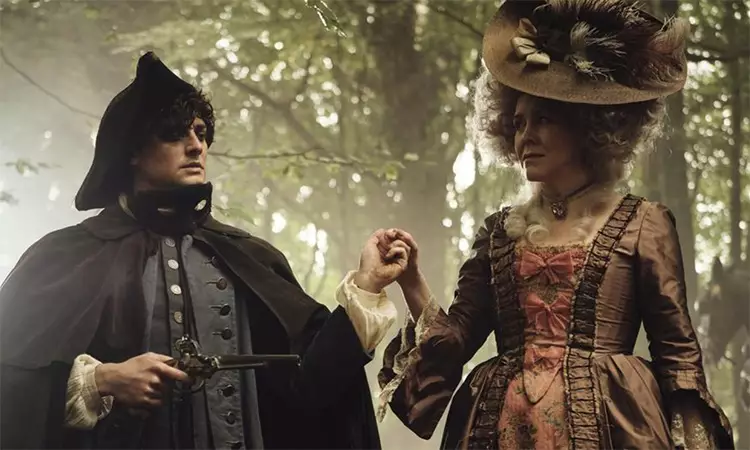The exploration of time and love has long been a captivating theme in cinema, and Alice Lowe’s *Timestalker* presents a unique take on this relationship. With a narrative that transcends multiple eras and intertwines the lives of its characters across time, the film provocatively interrogates notions of desire and the often destructive patterns it engenders. Through the character of Agnes, we are introduced to a cycle of unrequited love and obsessive attachment, which invites viewers to reflect on the consequences of romantic ideals that become dangerously consuming.
From its inception, *Timestalker* employs an interesting structure that places its protagonists across various decades—in 1688, 1793, 1847, and even reaching into the 22nd century. This manipulation of time not only adds an engaging narrative flair but also allows for an exploration of societal norms surrounding love and relationships across different historical contexts. Each incarnation of Agnes serves to illustrate an unchanging aspect of human behavior: the tendency to become entangled in relationships that offer little in terms of genuine satisfaction or fulfillment.
It is through her obsession with Alex that we see a repeating pattern emerge: Agnes sacrifices her own happiness and autonomy in favor of her desire for someone who repeatedly proves to be the wrong choice. This not only demonstrates the cycle of frustration that characterizes her life but emphasizes a broader commentary on the societal expectations around romance. By showcasing Agnes’s continued failures, the film critiques the very ideals of love that often lead individuals to neglect their own emotional well-being.
Love as a Duality of Joy and Destruction
*Timetalker* adeptly positions love as a duality; it is both the source of Agnes’s greatest joy and deepest despair. The film’s tonal shifts, oscillating between moments of lightheartedness and darker themes, reflect the complexities of romantic obsession. As Agnes goals to liberate Alex from his troubled existence, she neglects the love and support that her maid and friend Meg provides. This dynamic poses a poignant question: why do we often overlook those who genuinely care for us in pursuit of the elusive, self-destructive ideal?
The character of George serves as another example of love’s toxic nature. His relentless affection for Agnes devolves into a type of obsession that mirrors her fixation on Alex. By portraying various forms of unreciprocated love—be it infatuation, friendship, or obsession—the film encapsulates the pitfalls of emotional dependencies that can lead to destructive consequences. In this way, *Timestalker* refuses to romanticize love; instead, it exposes the grim reality that can emerge when individuals become ensnared in their desires.
Lowe’s film extends beyond a mere exploration of time and romance, delving into the spirits of love that bind its characters. The constant swing between despair and fleeting hope serves as both a narrative engine and a thematic undercurrent. This relentless cycle showcases love’s propensity to trap individuals within their own fantasies, urging viewers to confront how societal narratives often glorify unhealthy attachments.
Interspersed throughout *Timestalker* are visual motifs—like the oversized digital heart and the vibrant colors—that symbolize the emotional chaos of romance. The juxtaposition of a seemingly innocent search for love against the backdrop of obsessive behaviors invites the audience to examine their own experiences with desire. As Agnes becomes increasingly aware of Alex’s true nature, the film reveals a disillusionment that resonates deeply—a moment where the allure of passion fades, and the harsh light of reality sets in. Her romanticized vision, once exhilarating, evolves into grim recognition of the pain it has wrought.
The recurring theme of reincarnation not only emphasizes the cyclical nature of Agnes’s relationships but also reveals the possibility for growth. Though she repeatedly faces the consequences of her choices, every new iteration serves as an opportunity for introspection and gradual evolution. The film ultimately suggests that awareness is a critical facet of transformation: the more Agnes learns about herself and her affections, the closer she comes to breaking free from her self-imposed chains.
By presenting these eternal narrative loops, *Timestalker* not only redefines the parameters of love but also examines our collective histories of obsession and self-deception. In its reflection on how these themes develop across time, it becomes clear that while we might be doomed to repeat certain patterns, there is always the potential for meaningful change if we can muster the courage to confront our realities.
*Alice Lowe’s *Timestalker* is an insightful film that strips away the romantic veneer associated with love and examines its more sinister aspects. By disassembling the traditional romance narrative, it provokes vital questions about desire, independence, and the intricate dance of human relationships—longing for liberation, yet often remaining ensnared within the confining grasp of infatuation.*

